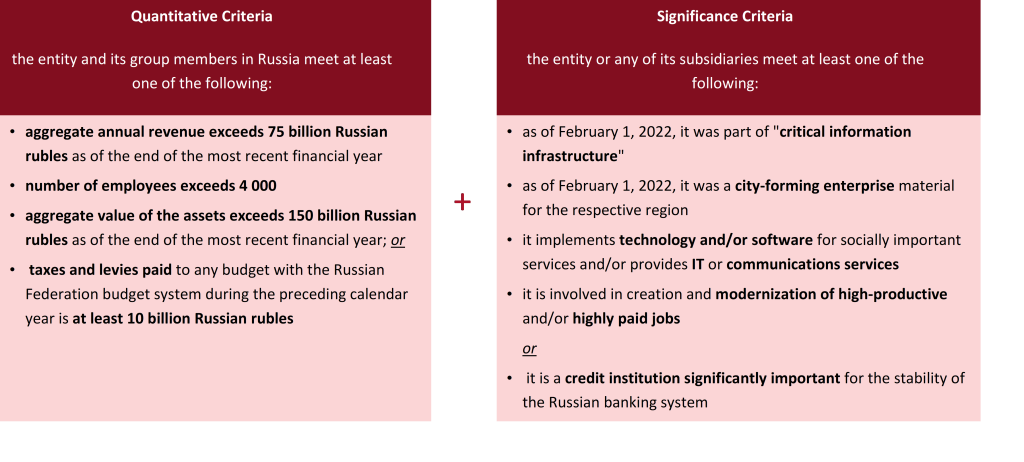Russian beneficiaries who hold interests in significant Russian businesses via foreign holding structures in “unfriendly” states will be able to get shares directly in the Russian companies. The new rules are designed to eliminate practical constraints in exercising their corporate rights which Russian UBOs are facing due to Western sanctions.
These new rules will apply to Russian companies which are (i) deemed by the Russian Government as “significant” for the economy and included in a special list in line with certain criteria, (ii) indirectly controlled by Russian residents through “unfriendly” foreign holding structures and (iii) whose operations are affected by international sanctions.
Effective from September 4, 2023, when the new Law "On Specifics of Corporate Governance in Business Companies Which Are Economically Significant Organizations" (the "Law") implementing these new regulatory provisions will come into force, Russian indirect shareholders of such “significant” companies will be allowed to apply to the Russian state court to directly acquire shares in a Russian “significant” company, suspend corporate rights of “unfriendly” holding structures and/or directly receive dividends bypassing such foreign holding entities.
Which Russian Companies will be Affected by the New Law?
The Law will apply only to Russian companies which meet all of the following criteria under A, B and C below:
A. Qualified as “economically significant organizations”
A Russian company may be considered an economically significant organization ("ESO") if it is included in the ESO list by the Russian Government. A company may be included into the ESO list if it satisfies the following criteria:

B. At least 50% owned by a foreign holding company connected to an “unfriendly” state
Under the Law, a foreign holding company (“FHC”) is deemed “connected” to an unfriendly state not only if such holding entity is incorporated in an “unfriendly” state, but also if (i) it has a permanent place of business in or its revenue is generated predominantly from “unfriendly” states(s) and/or (ii) the majority of its shareholders are connected to unfriendly state(s). Thus, even FHCs incorporated in “friendly” jurisdictions may fall under relevant criteria established by the Law and a thorough analysis on its connection to an “unfriendly” state may be required in each particular case.
C. Indirectly owned by Russian Beneficiaries
Russian individuals and/or entities shall hold directly or indirectly more than:
- a 50% share in the FHC
- a 30% share in the FHC, provided their votes were sufficient at the most recent general shareholders meeting of the FHC to pass a decision or
- a 20% share in the FHC, if the ESO itself or any direct or indirect shareholders in its FHC who hold individually or in aggregate at least 20% shares in the FHC, are subject to US or any other state or international organization blocking sanctions (“Russian Beneficiaries”).
The Law provides for a broad list of indirect shareholding criteria to determine who could be deemed to have indirect share in a FHC. These criteria go beyond the notion of just being a holder of the FHC shares and include holding of ADRs, shares in investment funds holding a stake in the FHC and other grounds allowing directly or indirectly to acquire shareholders’ rights with respect to FHC or otherwise influence its operations.
When Restrictive Measures may be Introduced?
Restrictive measure can be introduced in the following cases, rather broadly defined in the Law:
- the FHC is avoiding or refusing to exercise corporate rights and/or perform in good faith the shareholder’s obligations with respect to the ESO, or there is a possibility of this;
- the FHC’s actions or failure to act have been aimed at impeding the management of the ESO and/or its ordinary course of activity, including where the ESO’s CEO or the collegial management bodies nominated (wholly or in part) by the FHC cease to exercise their managerial functions; or
- other actions or failure to act by the FHC that may result in termination or suspension of the activities, liquidation or insolvency of the ESO.
The Law provides for a list of several specific instances when the above circumstances are presumed to take place, including (i) termination by the FHC of commercial contracts important for the operations of the ESO without an economic cause; (ii) a declaration made by the FHC or the ESO on termination or suspension of its operations in Russia, (iii) a lay-off notification made to more than 1/3 of the ESO employees, (iv) actions made by the FHC to comply with international sanctions which negatively affect normal operations of the ESO, etc.
All such actions / inactions shall have taken place after February 24, 2022.
How Restrictive Measures are Introduced?
The restrictive measures can be introduced only by the state Arbitrazh court of the Moscow Region (the “ACMR”) at a claim filed by (i) the state authority responsible for the relevant industry the ESO is operating in, (ii) shareholders of ESO, its CEO or board members, or (iii) Russian Beneficiaries.
While this new mechanism presumes suspension of corporate rights of foreign shareholders only following an assessment of each particular case by the court, it is not clear yet how it will be implemented in practice and, in particular, how judges will evaluate each case and determine the presence or absence of legal grounds for the introduction of restrictive measures.
The restrictive measures can be imposed for a term determined by the court, but not longer than up to 31 December 2024.
What does the Introduction of Restrictive Measures Mean?
A. Suspension of foreign shareholders corporate rights and acquisition of direct shareholding by Russian BeneficiariesIf the suspension is introduced:
- the FHC loses voting rights at ESO shareholder meetings. It is not allowed to participate in the meeting or request the meeting to be held, nor can it exercise any other corporate rights, including right to receive dividends or pre-emptive right (right of first refusal);
- the FHC can no longer dispose of its shares in the ESO, and no such shares can be sold or redeemed other than as specifically permitted by the Law;
- all of the ESO shares owned by the FHC are transferred to the ESO itself; such transfer shall be implemented within 1 week following the court decision on suspension is delivered to the shareholders registrar;
- Russian indirect shareholders of the ESO are obliged (i) to become direct shareholders of the ESO pro rata to their indirect participation in the ESO or (ii) nominate another Russian person to acquire direct shareholding in the ESO instead of them; and
- The FHC may claim for payment of compensation to be calculated as the market value of the ESO shares not distributed to Russian indirect shareholders (the “Compensation”).
If the FHC is a public company the ESO is subject to mandatory transformation into a public joint stock company in a simplified manner.
In addition, upon the application of the FHC’s Russian shareholders the court may incorporate a new Russian holding company for the ESO to be owned by all former indirect Russian shareholders of the ESO. Arguably, this mechanism may be used to facilitate conversion of Russian business corporate ownership structures to Russia from abroad.
B. Direct payment of dividends to Russian Beneficiaries
Indirect Russian shareholders of the ESO may apply to ACMR claiming that dividends declared by the ESO but not yet paid are paid to such Russian shareholders directly, bypassing the FHC. Such claim can be filed by indirect Russian shareholders of the ESO holding (i) more than 50% of shares in the FHC or (ii) more than 30%, provided such number of votes was sufficient at the most recent general shareholders meeting of the FHC to pass a decision.
In addition, if the FHC holds 75% or more shares in the ESO, (i) Russian shareholders of the FHC holding more than 50% of its shares or (ii) the board of directors of the ESO may declare dividends to paid by ESO to the indirect Russian shareholders, bypassing the FHC.
When Restrictions can be Lifted?
The imposed restrictions may be lifted by the ACMR upon the application of the ESO’s shareholders, in case that:
- the unfriendly actions and/or other reasons for the suspension of the corporate rights have terminated; or
- the FHC proves to the court that it behaves in a compliant manner and provides an assurance that no unfriendly action is made in the future.
Important to note that in such event, the FHC is allowed to re-acquire only the ESO shares owned by the ESO, provided no compensation was paid to the FHC in relation to such shares. Russian shareholders who acquired shares in the ESO directly as a result of the restrictive measures will retain their direct shareholding even after the restrictions are lifted. Even in the positive scenario, when and if restrictions are lifted in the future, these rules may substantially affect shareholding ratios and economic rights of shareholders in foreign JV companies, as Russian Beneficiaries will continue holding shares in the foreign JV company and will also hold shares in the Russian operational company directly.
Contacts:
Sergei Voitishkin, partner, Moscow
Dmitry Marchan, partner, Moscow
Sergey Krokhalev, partner, Moscow
Maxim Kalinin, partner, St. Peterburg










